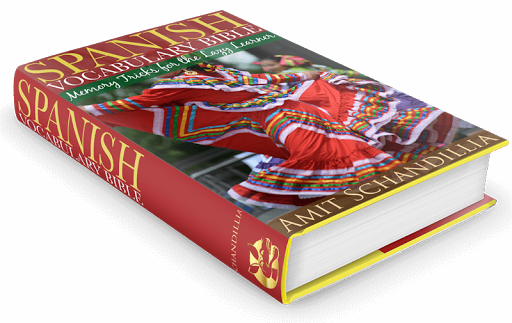Why are word-lists ineffective?
 |
| Mugging up words in isolation is infinitely ineffective Photo credit: kafka4prez licensed CC BY-SA 2.0 |
Secondly, mugging up words out of context is never a sure-fire way of committing them to memory in the long run; such words are highly prone to being forgotten. The keyword here is “context”. Without context, everything is meaningless and all efforts are wasted efforts.
For example, let’s take the word, ir (to go). You have written down this ever-important word in your notebook, in your flashcard, in Anki®, everyplace and have revised it over and over again say, a thousand times until you remember that ir means to go. Now, let’s put this newly-acquired vocabulary to some good use. Try saying, “I am going to the bank” in Spanish (voy al banco). Given that you already know that the subject (here, yo) is omitted in Spanish, that “to” loosely translates to a in Spanish, that the Spanish for “the bank” is el banco, that a and el when together become al, and that the Spanish for the English verb, “to go” is ir, you will most likely not be able to think this sentence in Spanish and be spontaneous with your rendition the way fluent natives are. Reason? You translate each word into Spanish, conjugate the verb according to the tense in question, string them together, all in your head before you speak a single sentence. All this takes time. And costs confidence.
Ever noticed how some people are so thorough with English that they could devour classics like Shakespeare and produce literary masterpieces in the form of exquisite poetry and essays without so much as touching a dictionary or thesaurus? Ever noticed how some of them despite their massive knowledge of English, still cannot speak with a consistent, sustained fluency for any length of time in practical situations? What do you think sets them aside? Always remember, knowledge of a language is in no way proportional to conversational abilities or fluency in that tongue.
The effective way
We don’t conjugate and translate before speaking if it’s English, do we? We are fluent because we “think” in English. And thats the natural way with any organic language. So, what am I hinting at? Learn the context, not the word. Learn sentences and phrases because they have words in readily useable form. And use them in your everyday life even if it makes you sound stupid.
Take another example from my personal experience. I have always hated irregular verbs in Spanish and have always found remembering them a mountain of a task. Dar (to give) is one such verb. Remembering the meaning of this verb in its infinitive form didnt help much when speaking actual Spanish. One day I just happened to find out it’s imperative form, dámelo (give it to me). Then I went on a roll using it with everyone around me. When I felt romantic, I told my girlfriend, Dame el mano (give me your hand); when I needed a pen, I told my friend, Dame esa pluma (give me that pen). Got the idea?
Then one day I learned the phrase, dímelo (say it to me). This one sounded too similar to dámelo to ignore and it stuck. Now, just learning a couple of expressions, I effectively absorbed not just the Spanish for “give” and “say” but also some vital grammar such as, direct and indirect object pronouns and imperative conjugations of -ar and -ir verbs! I call this the bang-for-the-buck approach. Context. Learn words as parts of phrases and sentences and use them in context and I promise you will remember new words and get fluent in Spanish without actively striving for it.
So, the key takeaway from this rant is that your flashcard decks, physical or software-based, should be loaded with contextual sentences and not isolated words if you wish to get fluent in Spanish. Even if you are using visualization and mnemonics to memorize lists of words, try applying it to phrases or sentences instead of mere words. Color whatever you learn with practical context – context that will eventually facilitate not just speaking in Spanish but even thinking in it. Thinking in Spanish is the essence of fluent speech. If you continue to translate and conjugate while speaking, you will not be able to sustain a reasonably fluent conversation despite an otherwise strong knowledge of the Spanish language and even literature. Try it for yourself and let us know what it did to your Spanish.



.png)